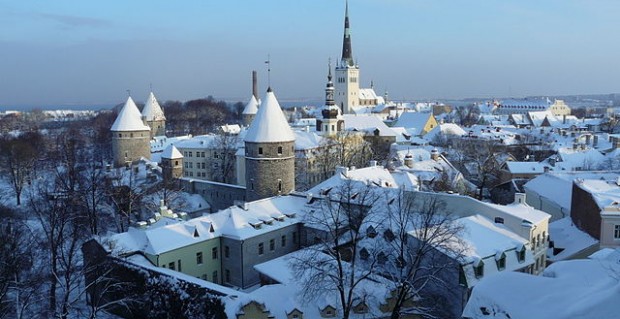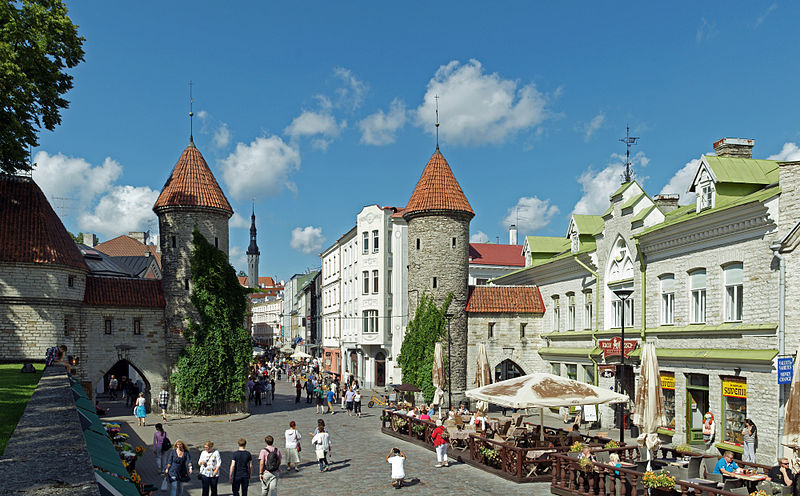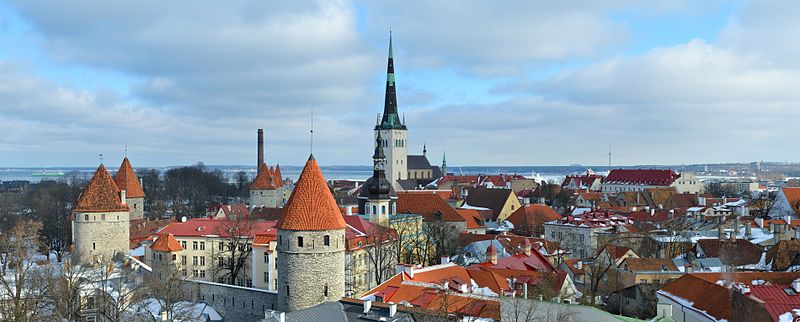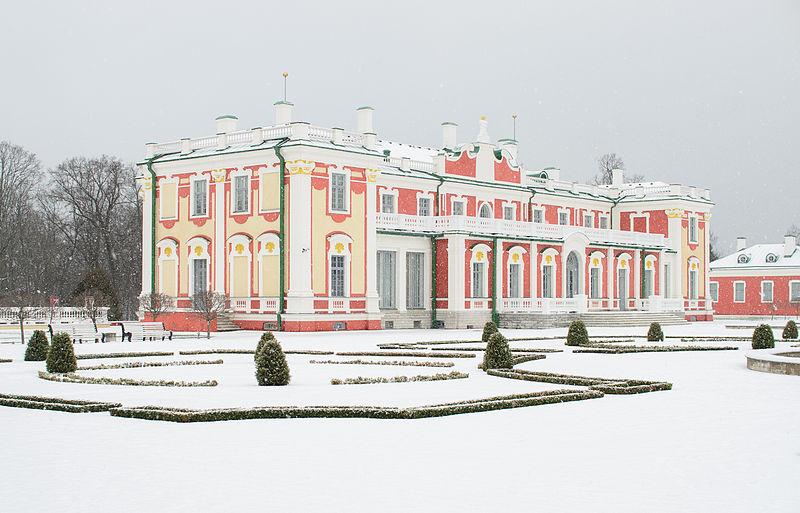Tallinn

(photo by Zigomar)
P’s father, Hugo, maintained that the only good thing about being drafted by the Red Army was that being captured by any other side would be a bonus. In 1940, he was deferring his University studies, doing national service, then a requirement in free Estonia. Then the Ruskies moved in (it was ironic to see them celebrating recently the anniversary of the end of WWII, since they had a pretty big hand in starting it, along with Hitler) and simply annexed Estonia, and the rest of the Baltic States. Lots of Estonian officials were liquidated (including P’s grandfather) and all private property confiscated (including his Tallinn townhouse and country estate) and Russian soldiers and bureaucrats set about digging up the garden of every manor in the country, looking for treasure. Hugo, a rather unsoldierly man, was dragooned into the army (fortunately, he spoke fluent Russian)* and found himself in a war.
Talk about a conflict of disloyalties! It recalls the old Estonian WWII joke: an Estonian sniper is up a tree. 50 metres to his left, he sees a Wermacht soldier, breasting through the snow. About the same distance to his right, he sees a Soviet private hovering. Whom does he shoot first? Obviously, he shoots the German first – ‘business before pleasure.’
In any case, Hugo was fortunate again, catching a German bullet in his leg and, such was his faith in Soviet medicine that he waited till 1982 to have it removed (in Adelaide). After the war, the USSR maintained and increased its iron grip on Estonia, the Baltic State most begrudging and resistent to the new Russian enlightenment.**

In 1997, some years after the collapse of the USSR and consequent liberation, P got to visit the post-iron-curtain place of Hugo’s birth. There was also a little business on hand – to check out the real property to be returned to victims of the Soviet rule. A minbus rolled up to the Latvian border and after a nervous half-hour wait, he was admitted to Esti, jewel of the Baltic. Through lush forest the van proceeded, to the seaside resort town of Parnu. Thence to Tallinn, the medieval city 10° south of the Arctic Circle. Heavy hotel curtains could be drawn against the northern light, still rather bright about 11 pm. The ancient fortifications – turrets and towers connected by high ancient walls, are still wonderfully intact – from which you can gaze out to the Gulf of Finland and Baltic Sea.
Boarding a tram in order to get to Kadriorg Park, there was an encounter with good old-fashioned Russian officialdom. They kicked us off for not having bought a ticket (where you could get one, who knew?) and but for poverty of lingua franca, P could have conveyed a friendly response – something like “You’re not the boss here anymore, Durack!” (What is it with apparatchiks on the continent and tickets? See Bitings on a Complimentary Basis and please explain).
At the corner of Poska and Wiedermanni, there was the Jakobsen house – where Hugo and his sister Anna played – looking a little bedraggled but not as ruinous as the various manorial piles disported through the country. Someone peered out suspiciously from behind the curtains. Then came an afternoon tea with a lovely old lady, who had spent 10 years in Uncle Joe’s gulag – she certainly looked like an enemy of the people – her rooms revealed a wealth of pretty things she had successfully concealed during the repression – and she produced a cherry liqueur that crept up on one with vicious stealth. If you are about north-eastern Europe or Scandanavia, we recommend dropping in for a few days to Estonia, and Tallinn in particular – it is handsome, friendly, civilised and fairly unspoiled. It is also a beacon of freedom withstanding the shadow to its East, a shadow that we fear is lengthening.
[*TVC recommends reading Sentence:Siberia by Ann Lehtmets and Douglas Hoile (1994) Wakefield Press.] [** See for example, KGB by John Barron (1974), p. 54-55: “Although the Russians occupied the little Baltic nation in 1940 as part of a deal with Hitler, the Estonians have stubbornly striven to perpetuate their language and culture. Sakharov found it delightful. However, he was constantly aware of a sullen hostility which the Estonians communicated in every manner they safely could. Twice after requesting street directions, he was deliberately steered far from where he asked to go. In shops, clerks ignored him as long as another customer was present.One evening in a Tallinn hotel lobby, he met Aeroflot crew members who invited him to come along for a birthday celebration at a restaurant that had a jazz band. When the party was recognized as Russian, the band abruptly stopped in the midst of a jazz tune and started playing “Deutschland über Alles.” Many diners joined in this insult to the Russians by rising and singing the old German anthem.
Once Sakharov saw a man buying a fishing rod in a store. He decided to purchase one. “These are for display only, not for sale,” said the clerk, a thin little man of about sixty. “But I just saw you sell one,” Sakharov persisted. “For display only,” repeated the unyielding Estonian. “Look, what have you got against me?” exclaimed Sakharov in exasperation. “What do you want?” “We want you to go away and leave us alone,” replied the clerk.”]
Leave a comment...
While your email address is required to post a comment, it will NOT be published.





2 Comments